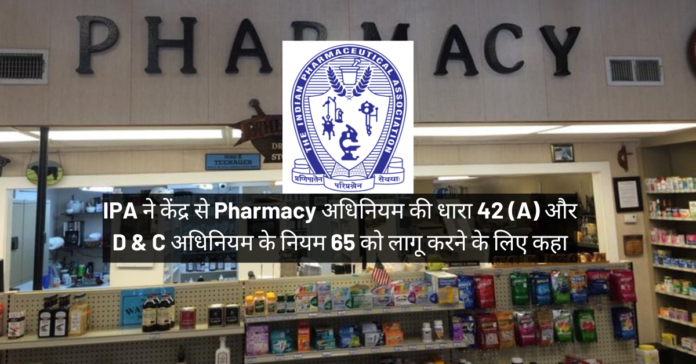The Indian Pharmaceutical Association (IPA) urged the union health ministry to speed up efforts to implement Section 42(a) of the Pharmacy Act 1947 and Rule 65 of the Drugs and Cosmetics Act 1945 in the pharmaceutical trade sector in order to counter efforts being made by online pharmacy companies and corporate entities engaged in e-pharmacy business.
The group believes that once this legislation and associated regulations are in place, a person will not be able to obtain a prescription-only medicine without a registered pharmacist first reviewing it. Also, it will be required that drugs be acquired only after being carefully inspected by a qualified and authorised dispenser. Members of the IPA who are pharmacists-cum-traders believe that these clauses can be used as a powerful instrument to stop the growth of the e-pharmacy firms from expanding their operations throughout India. Sources claim that the organisation indirectly supports the merchant community.
In order to show its allegiance to the traders, IPA, the first organisation of pharmacy professionals to be established in India, has requested that the Government of India strictly monitor the purchase, sale, and dispensing of medications by pharma traders and make sure that the drugs are getting to end users through licenced pharmacists. The group advises the government’s secretary that it is past due for the government to enact laws that rigorously follow the drug laws in place in industrialised nations. According to the IPA, pharmacists are in charge of assessing prescriptions for any potential drug-related issues on a global scale and appropriately delivering medications following appropriate counselling. They demand that the method be immediately implemented in India by the government as well.
The Indian Pharmaceutical Association (IPA) claims that operating a pharmacy without a registered pharmacist and selling prescription drugs (Schedule H/H1) without a valid prescription are both extremely illegal and dangerous to one’s health in a letter sent to the secretary to the Government of India (Health), with a copy to the DCGI. The group claims that only in India, which is referred to as the “pharmacy of the world,” are scheduled pharmaceuticals sold in this manner. In order to encourage other countries to follow our example, the IPA wants the government to make India a leader in the administration of drugs.
According to association sources, distributing medications on any prescription is required to be done in the actual presence of a registered pharmacist per Section 42(a) of the Pharmacy Act. The D&C Act 1945’s Rule 65 was modified in the same year that the Act went into effect, giving it even more support. Despite the establishment of all these laws and regulations, unlicensed pharmacists nevertheless sell medications through retail pharmacies even if the sale licences are given to registered pharmacists. The IPA claims that even when it comes to the sale of regulated substances, community pharmacies do not hold sufficient supervision by licenced pharmacists.
The IPA has told the government that there is currently more than enough certified pharmacists in the country to meet all needs. So, the regulations governing the sale of pharmaceuticals through retail pharmacies while being supervised by registered pharmacists can readily be implemented by the government. Drugs are stocked and sold at pharmacies, where pharmacists are employed.
AIOCD, the national trade association for pharmaceutical traders in India, recently decided to stage a nationwide “Halla Bol” (Raise Your Voice) agitation in opposition to the e-pharmacy industry and other unethical business practises by corporate companies. However, the agitation was postponed as a result of government intervention. According to a senior member of the association, the IPA is now hoping that by applying pressure to the government to enforce Section 42 of the Pharmacy Act, it would help the government put an end to the sale of drugs online.



